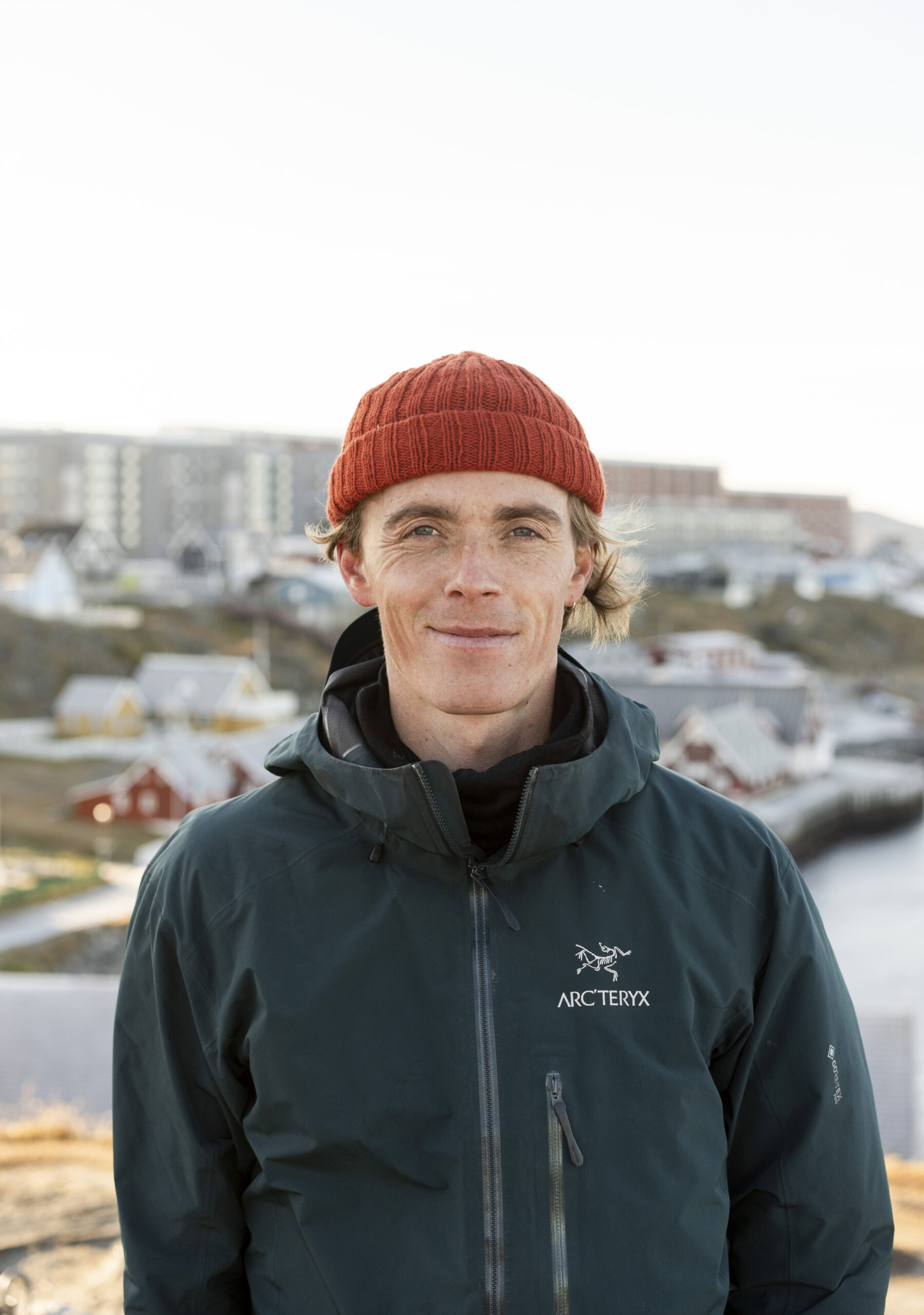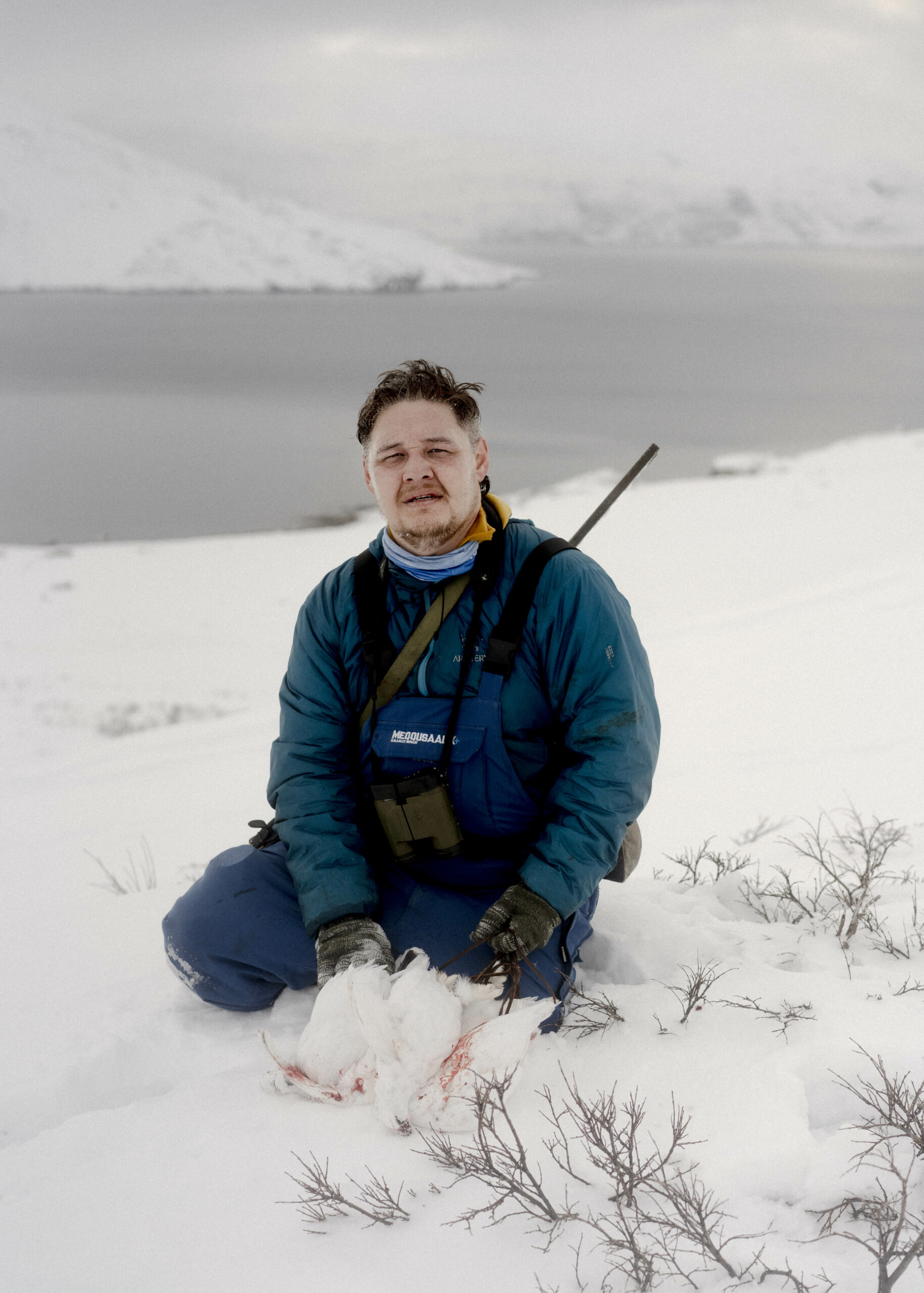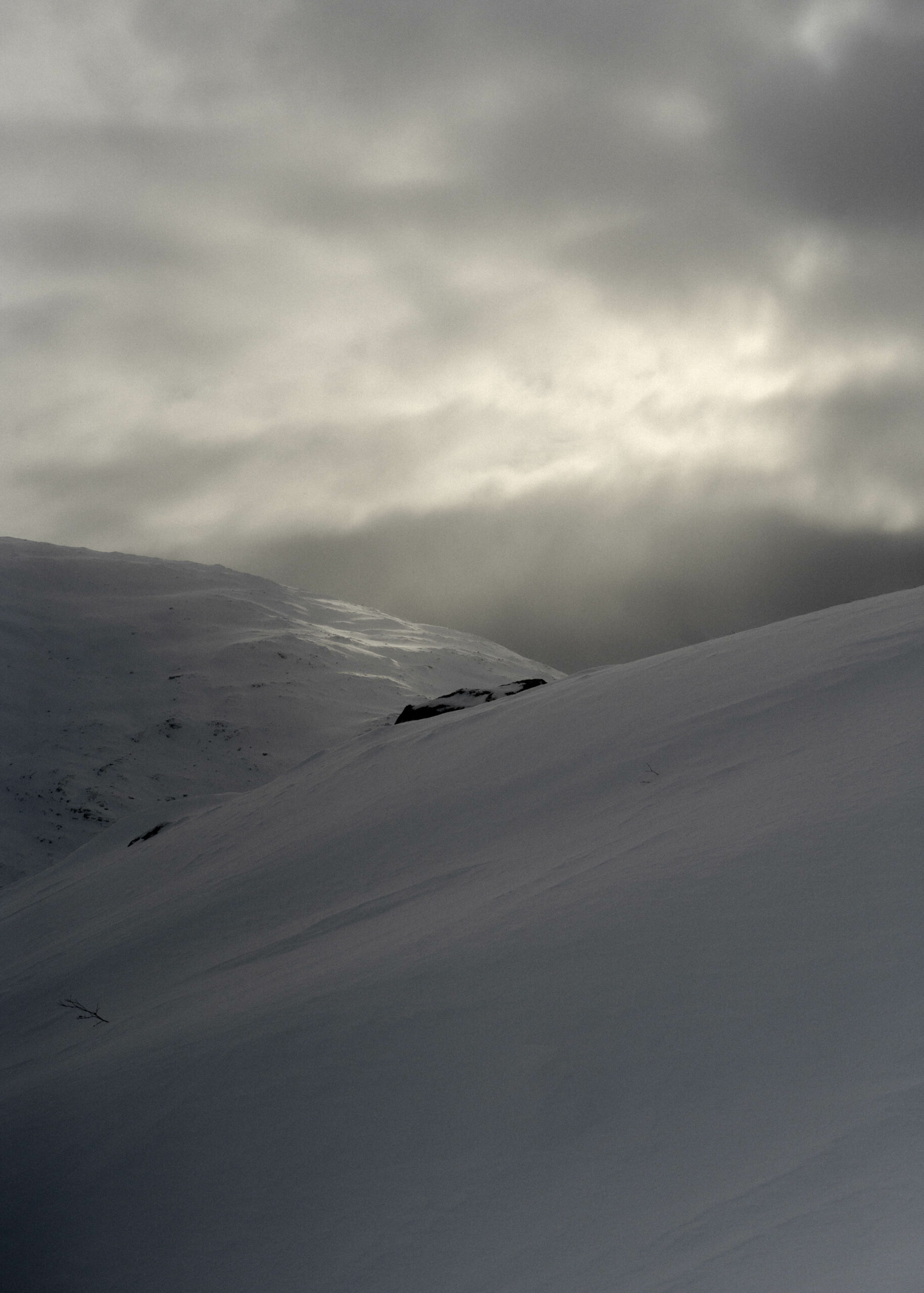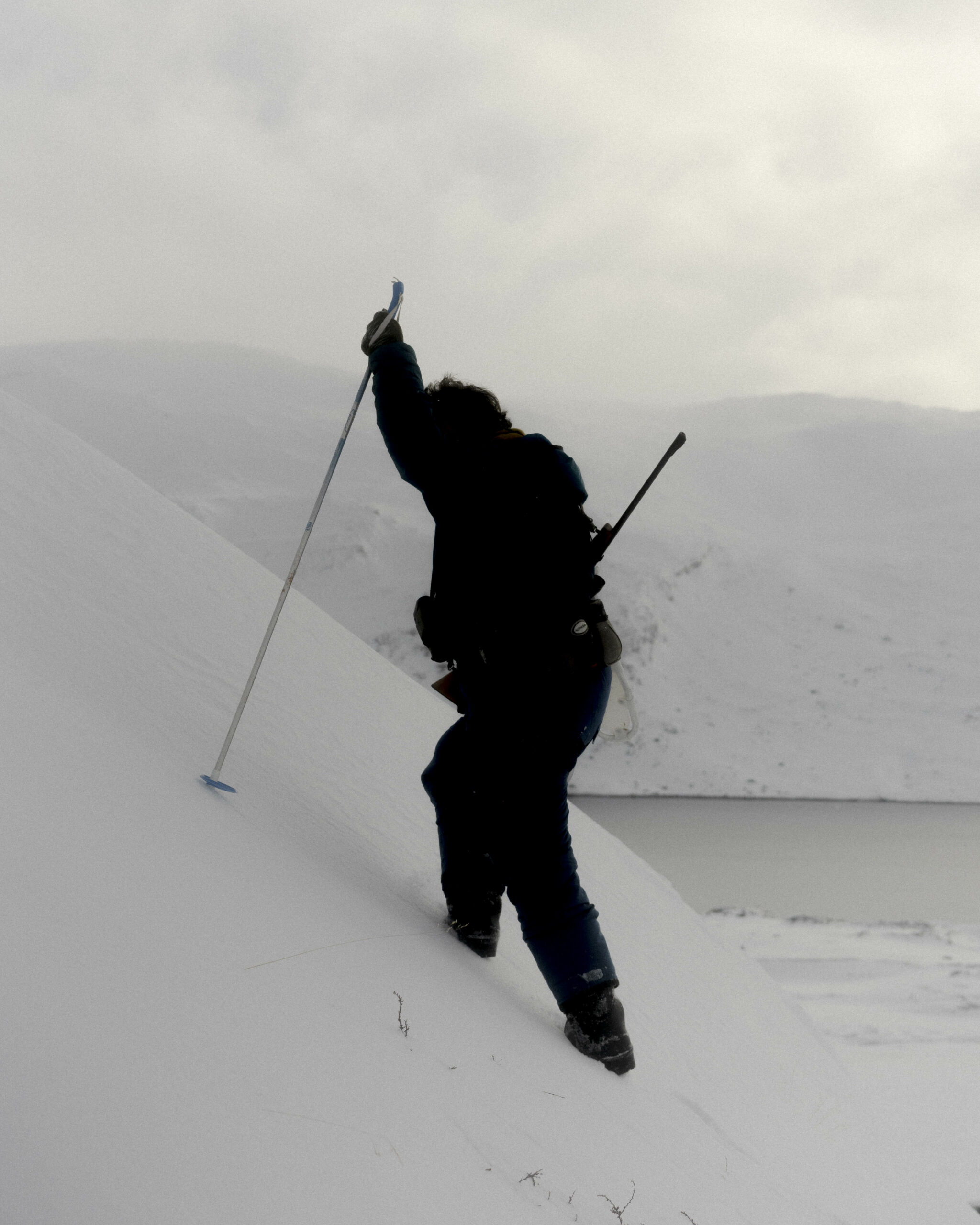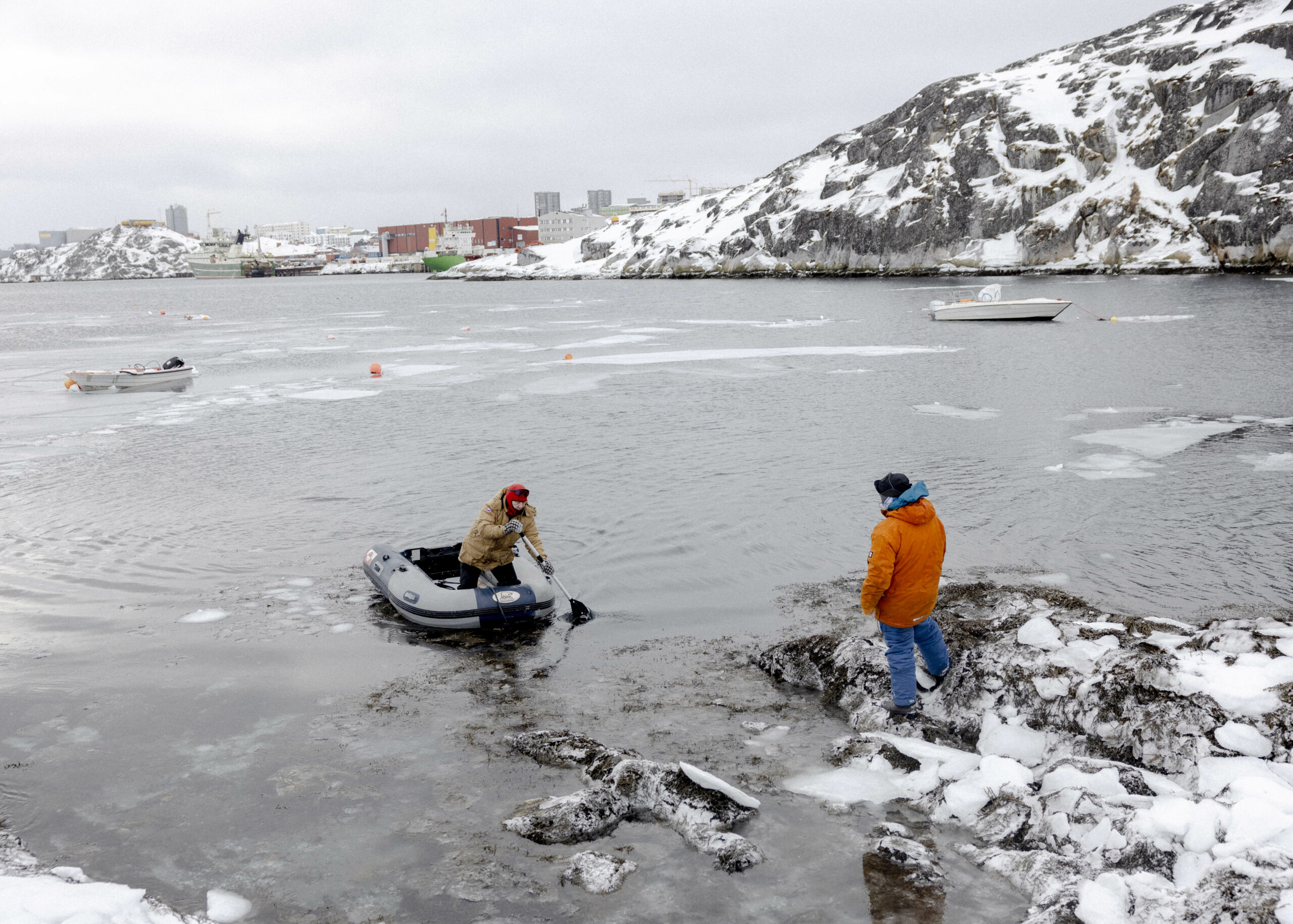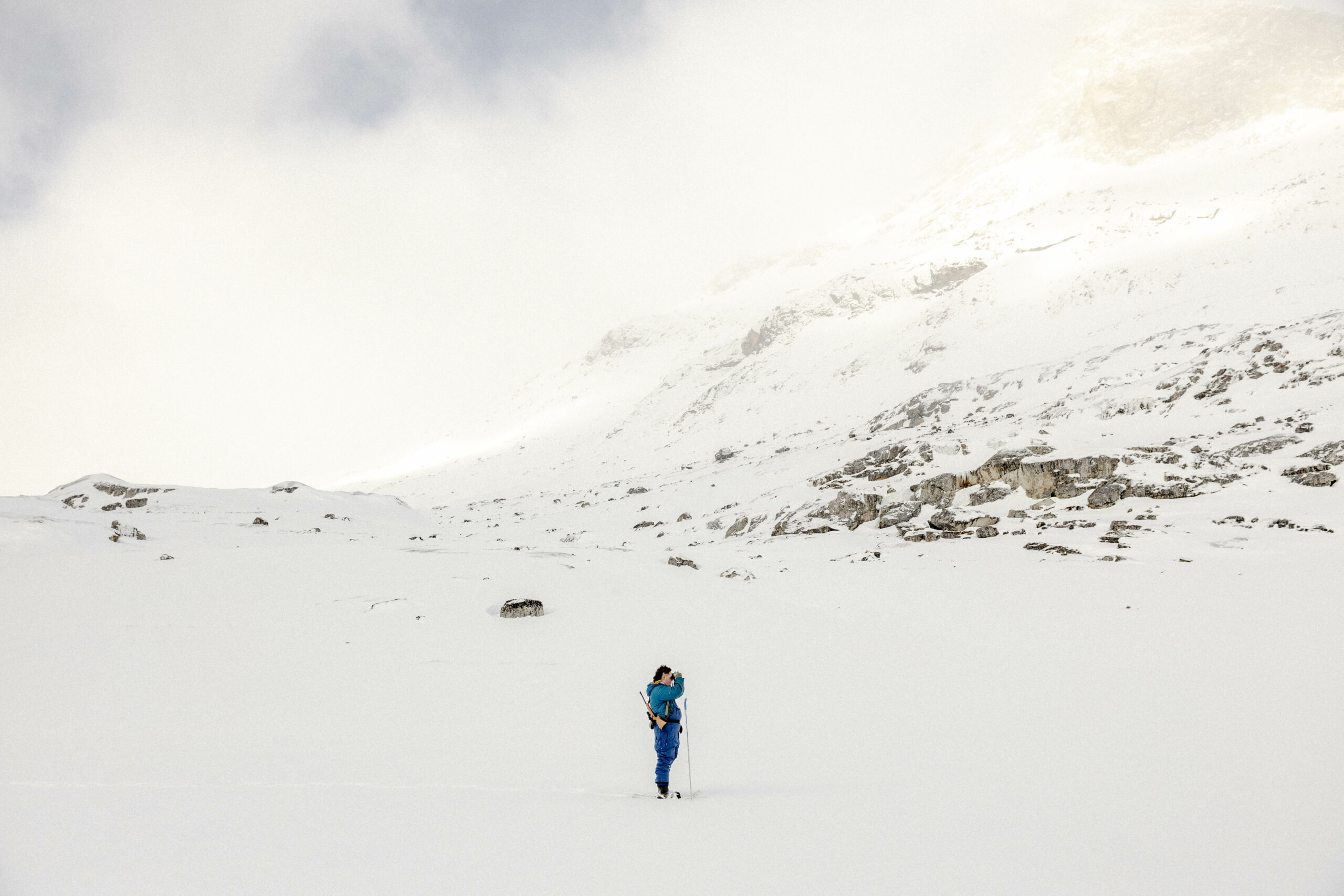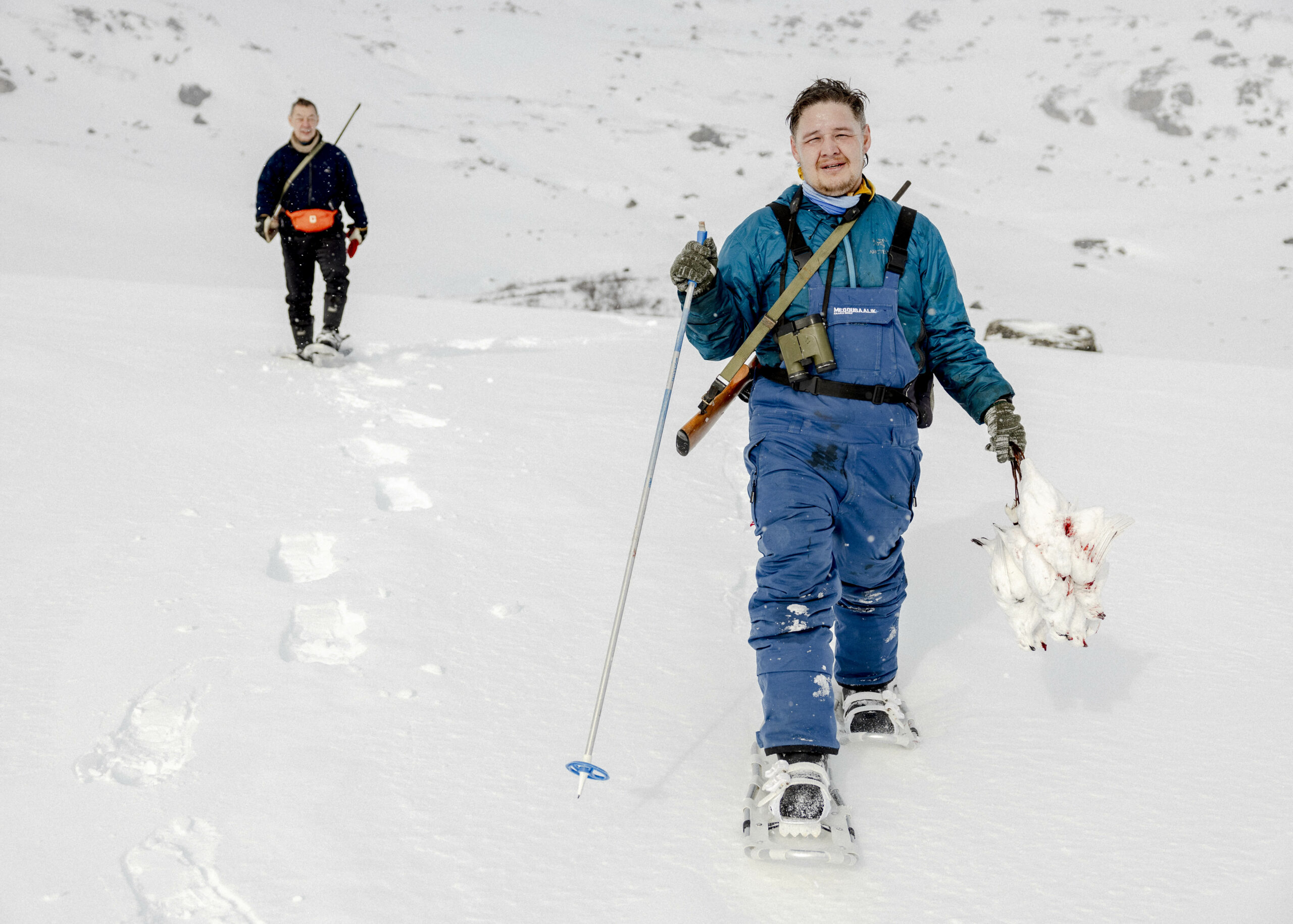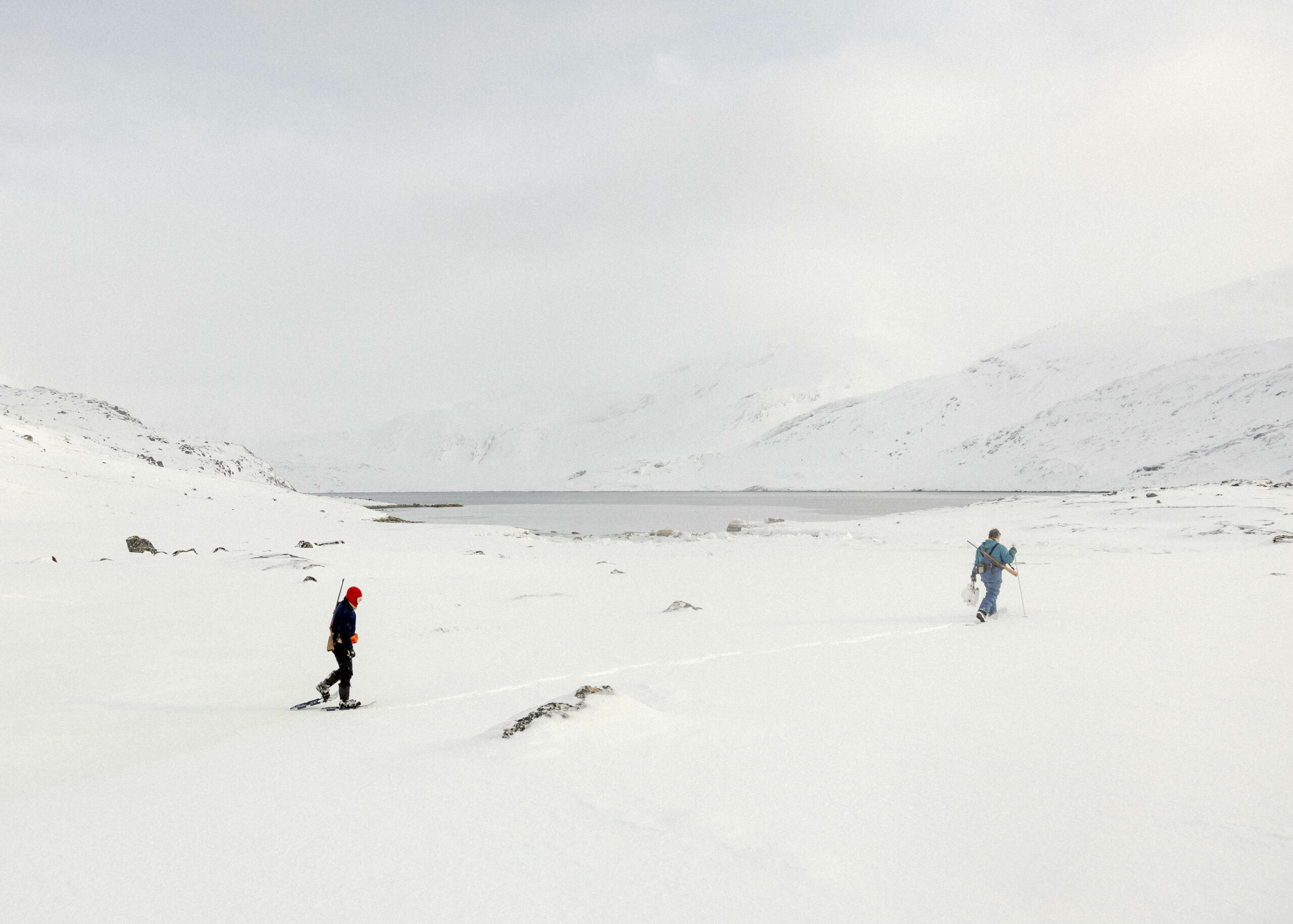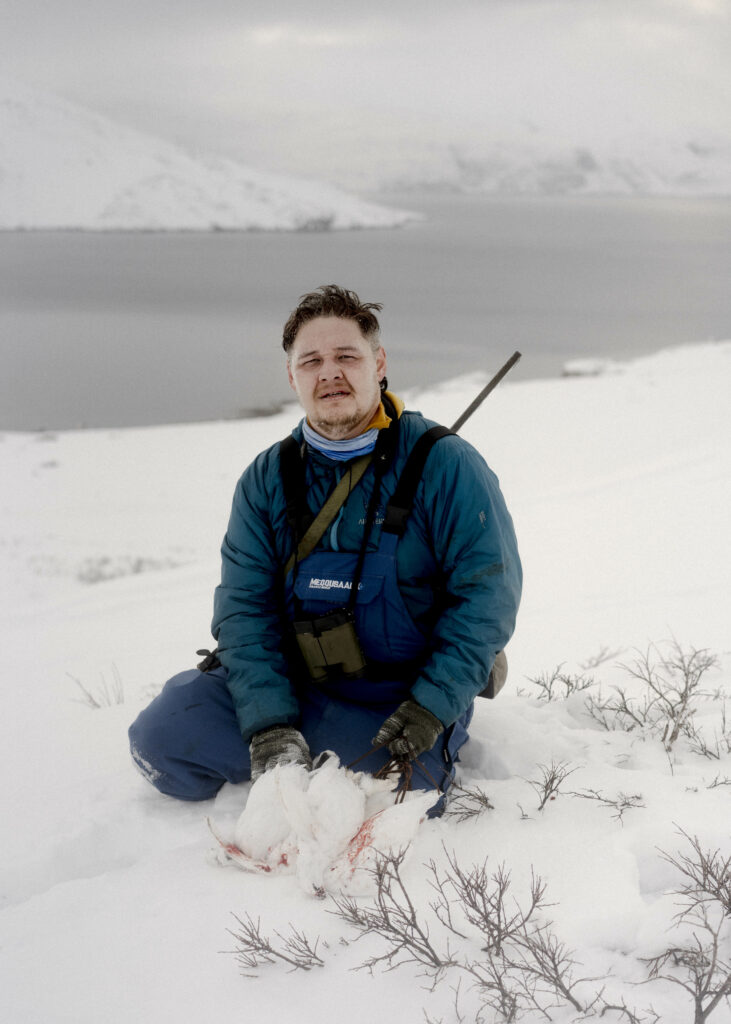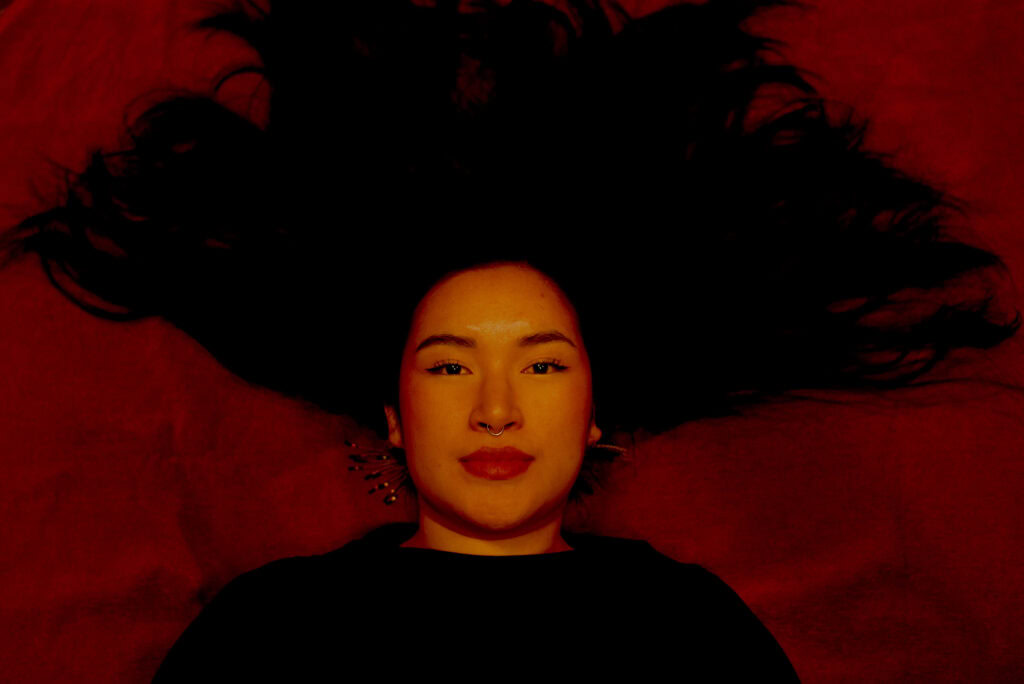Qiteraq Eugenius:
"There is a cultural pride in hunting.”
Photo – Oscar Scott Carl – Visit Nuuk
Qiteraq Eugenius has been hunting around Nuuk since he was a little boy. “There is a cultural pride in hunting,” he explains. Join his favorite hunt among jagged mountains and the sound of silence. Ptarmigan hunting in Greenland.
With charismatic finesse, Qiteraq Eugenius moves along the mountain wall in Sermitsiaq Bay, an hour’s sail from Nuuk. He stops and lifts his binoculars in front of his eyes, calmly scanning the landscape. We are in the midst of his favorite hunt: Ptarmigan hunting. The pursuit of the beautiful white game bird that lives and survives in the harsh, extreme, and extremely beautiful Greenlandic landscape. Normally, the boat trip from Nuuk to Sermitsiaq Bay takes only half an hour, but today it has been doubled by the sea, which has risen in line with the cold northern wind blowing. We are in Nuuk’s backyard. The city where 33-year-old Qiteraq grew up and has been hunting since he was a little boy. Most often in the company of his father, Nukaraq Eugenius, who also accompanies him on today’s hunting trip. However, Qiteraq’s father is not on the mountainside. He follows from the boat and spots ptarmigans from there because, as Qiteraq says, “From the boat, you have a much better overview when you can see the entire mountainside at once.”
The light is not optimal for ptarmigan hunting today. Both Qiteraq and Nukaraq mention it before we set off. The clouds have settled heavily over Nuuk, and the wind is blowing about 10 meters per second. You become snowblind, they explain. But they also know that if you just sail a short distance into the world’s second-largest fjord system, located in Nuuk’s backcountry, the weather can look completely different. That’s also the case today. The cloud cover is not as massive here, where we follow the mountain ridge and hope to spot ptarmigans.
Cultural Pride
If you ask Qiteraq why he hunts, there are several answers. A significant part of the reason is locally rooted:
“There is a cultural pride in hunting. It is a way to preserve our culture. Traditionally, hunting has played a significant role in our culture,” explains Qiteraq Eugenius.
In addition to the cultural pride, there is also a personal motivation:
“I find a special peace when I am hunting. My brain completely relaxes,” he describes.
Peace disappeared for a while in Qiteraq’s life. Working as a real estate agent in Nuuk demanded many hours. Too many. Eventually, the job became so overwhelming that he was hit by stress. Now, Qiteraq works as a sailor for a local trophy hunting provider and has just completed a course so that he can be a skipper for up to 12 people. In the future, Qiteraq hopes that he can organize even more hunting trips for both tourists and locals, and thereby be out in nature. And there is a good reason for that. “I forget about everyday life and worries out here,” he says, supplemented by his father:
“Many talk about gathering energy in nature. I would rather say that you unload from all stress and hurry. When you sail away at a calm pace, you get a sense of relaxation. It’s a kind of meditation,” explains Nukaraq.
”"I find a special peace when I am hunting. My brain completely relaxes. "
Qiteraq Eugenius:
Eight Ptarmigans
On the mountainside, Qiteraq takes off his jacket. “I love being out here. Your senses are sharpened. You hear better. See better,” he says, as sweat begins to trickle down his forehead.
It’s quiet here. Qiteraq looks focused. “Could you hear that?” he exclaims. “I think it was a ptarmigan.” He looks around. There is nothing to see. We continue walking in the crunching noise of the snow under our snowshoes. Suddenly, a couple of ptarmigans fly up a few hundred meters in front of us. They fly behind a rise in the landscape, so you can’t see where they land. We try to climb up the mountainside, but it’s too steep, so we turn around and go down to get to the area where the ptarmigans landed. Qiteraq spots one again. It sits on top of a large stone, watching over the landscape. In every flock, there is typically one male, sitting on a high point and keeping an eye out for danger. A few hundred meters further down, where the mountain meets the sea, Nukaraq sails around and watches over his son, whom he has passed on his hunting experience to.
As Qiteraq approaches the ptarmigan, it flies away again. It lands once more somewhere out of sight. Qiteraq climbs a steep snow wall with a keen eye and a wet back. He spots not just one ptarmigan but a flock of about 10-12 birds. “We’ll leave the snowshoes here to make less noise,” explains Qiteraq, taking off his snowshoes and placing them behind a stone.
Qiteraq relaxes his shoulders, crouches down, and slowly moves towards a large stone ten meters ahead. He rests his .22 Long Rifle Anschutz on the stone. The same rifle his Aataa (grandfather) used when he went ptarmigan hunting. The echoes of history are present in both the rifle, the hunt, and the surroundings. The mountains have seen this scenario before. Man hunting for food. Qiteraq aims and hits the first ptarmigan. The spotter, who sits on top of a stone about 30 meters away from Qiteraq’s position. The rest of the flock remains seated. He shoots two more. All in the neck. Then he can use the head in cooking.
A couple of ptarmigans roll down the steep slopes. Qiteraq is careful to note where the shot ones roll. Nothing should go to waste. He collects the downed ptarmigans and ties them together by the feet with a leather cord. Further down, Nukaraq has moored the small dinghy and is heading towards Qiteraq. He heard the shots. The sun casts its spring rays through the snow, and the grayish-white shades of the landscape form a backdrop for a successful ptarmigan hunt.
”"I'm glad that hunting traditions have been passed on to someone in the family so that Qiteraq can continue the tradition when I can no longer hunt myself. I am proud of him,"
Nukaraq Eugenius
Ptarmigan Year
Qiteraq and Nukaraq board the open dinghy and drink a hot cup of tea. In low revs, the two generations calmly move towards Nuuk. There is almost no wind as the open dinghy lies sheltered behind the towering mountains. Qiteraq looks towards the land and exclaims, “This is perfect light for ptarmigan hunting. When the sun shines like this, the ptarmigans light up like neon against the white snow.”
Nukaraq nods approvingly.
“I’m glad that hunting traditions have been passed on to someone in the family so that Qiteraq can continue the tradition when I can no longer hunt myself. I am proud of him,” he explains and continues:“Qiteraq can do more than I can. He is very attentive to cleaning, drying, and freezing what he shoots. He is a good hunter.”
The hunt is important. To fill the freezer and uphold traditions. A part of identity. Father and son talk about the various special things about ptarmigan hunting as the boat glides along. About the different calls the ptarmigans have and how they indicate different dangers.
“These are the kinds of things you learn when you’ve been out here a lot,” explains Qiteraq.
The ptarmigan hunting season starts on September 1st and lasts until April 30th. Some years, there are more ptarmigans than others. Locals call the special years “ptarmigan years.” Some believe it happens about every seventh year. Others do not believe it can be predicted exactly. However, there is agreement on the background for a good ptarmigan year: “Some years, the ptarmigans lay eggs twice. Then it’s a ptarmigan year. I think this year is one of them,” Nukaraq explains.
Nukaraq, who is at the helm, slowly accelerates. The boat moves away from the mountainside, and the sea rises. Waves splash over the edge. We sail around Nuuk and back into port. Six hours of hunting are over. Six hours in what feels like another world, just a short sail from the active city life. The “special tiredness after a day in nature,” as Qiteraq describes it, hits us all. Qiteraq takes a sip of the obligatory conclusion to a hunting trip here in the country, Faxe Kondi, puts the car in gear, and drives home.
Are you dreaming of going hunting in Greenland yourself? More and more people are experiencing the unique hunt accompanied by local guides in Nuuk’s backcountry. If you are curious about trophy hunting in Nuuk, you can contact a provider.
This is what you do
This story started out with the little girl in the mirror. Now Malu Lynge sits, a trained actress with three successful years behind her. The dream has come true, so what now? What about the future? Malu Lynge responds in line with something she mentioned earlier:
“My big goal is to travel to all towns and settlements in Greenland and be there with my art. Whether it’s with a performance, a workshop on how to light a Qulleq, or to perform a concert. I will work on reaching everywhere.”
But what if we turned the tables and Malu Lynge herself was in the questioner’s shoes? What question would she then ask herself?
“That’s a good question. I’m not sure if it’s a question, but I would probably remind myself of how important the work I do is. There is a purpose to it, and it’s important. This idea of passing something on through performances and concerts. This is what you do, and it is important, so just keep going,” she concludes.
To experience Nuuk’s rich culture scene check our events calendar, follow Visit Nuuk on Social Media and visit these websites:
